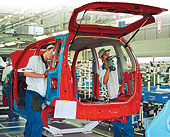 |
If you want to put your best foot forward towards a career tomorrow, there?s no point studying the appointment ads or banking on all those hotshot counsellors. Chances are that they?ll also be studying the appointment ads and looking at what?s in demand today.
?That?s why you had this enormous glut of software professionals,? says Mumbai-based HR consultant Shashi Rao. ?People looked at the Y2K demand and thought the party would never end.? Today, there is once again a huge demand for software professionals. The big companies are hiring. But nobody wants the products of the makeshift training institutes that mushroomed during the boom. That?s why we have a small army of the ?trained? jobless on the one side and a shortage of staff on the other.
If you don?t want to belong to this unemployed lot, there must be some way of identifying sectors that will boom. Sure, there are plenty of polls telling you what will be the hot jobs of tomorrow. But, most of the time, the polled sample is made up of jobseekers. You can?t expect them to be much wiser.
?Today, there is a window of opportunity to get authentic information,? says Rao. ?In five years? time, call centres would have moved on. Textiles, though it is very, hot today, would have cooled off. Look for the new sectors.?
Consultants McKinsey & Co has just come up with a study which gives some clear indications. According to the company, the big shift now will be from labour-intensive sectors (such as apparel) to skill-intensive sectors. At the top of the McKinsey list is computer hardware and consumer electronics.
| THE GOLDMINE FOR JOBS |
| Skill-intensive sectors that hold great potential for export to the US First wave: Computer hardware, consumer electronics Second wave: Auto components, fabricated metals, machinery, auto assembly, pharmaceuticals, telecom equipment Source: The next wave in US offshoring; The McKinsey Quarterly |
The study calls that the first wave. And India has missed the bus there. But there are many who are even today planning to tap the second wave. This list includes auto components, fabricated metals, machinery, auto assembly, pharmaceuticals and telecom equipment.
If you look at most of these, they are in the manufacturing rather than the services arena. Services will also be big. But, nurses and hairdressers will be exported to the West. The manufacturing jobs we are talking about are at home.
As little as two years back, every Indian business publication had carried articles on how ?The End of Manufacturing? was nigh in India. Today, most still say that because of our sagging infrastructure and omnipresent bureaucracy, China will take us to the cleaners. Talk to some China experts, however, and they will tell you that the country has huge problems that are being papered over. (The banking system, for instance, is close to collapse.) India is the clear choice of those who look beyond the fa?ade.
So engineering jobs will be growing apace. That might take a little doing if you don?t have the required degree already. But there are several slots in the new boom sectors that you can fill without being an engineer. How about a metallurgist? Or a designer, specialising in auto components?
?Look at all the jobs that are on offer in these companies. You?ll find what you are looking for,? says Rao. ?As imports from low-cost countries skyrocket, the manufacturing landscape could soon look quite different,? says McKinsey. So too will your job prospects.











